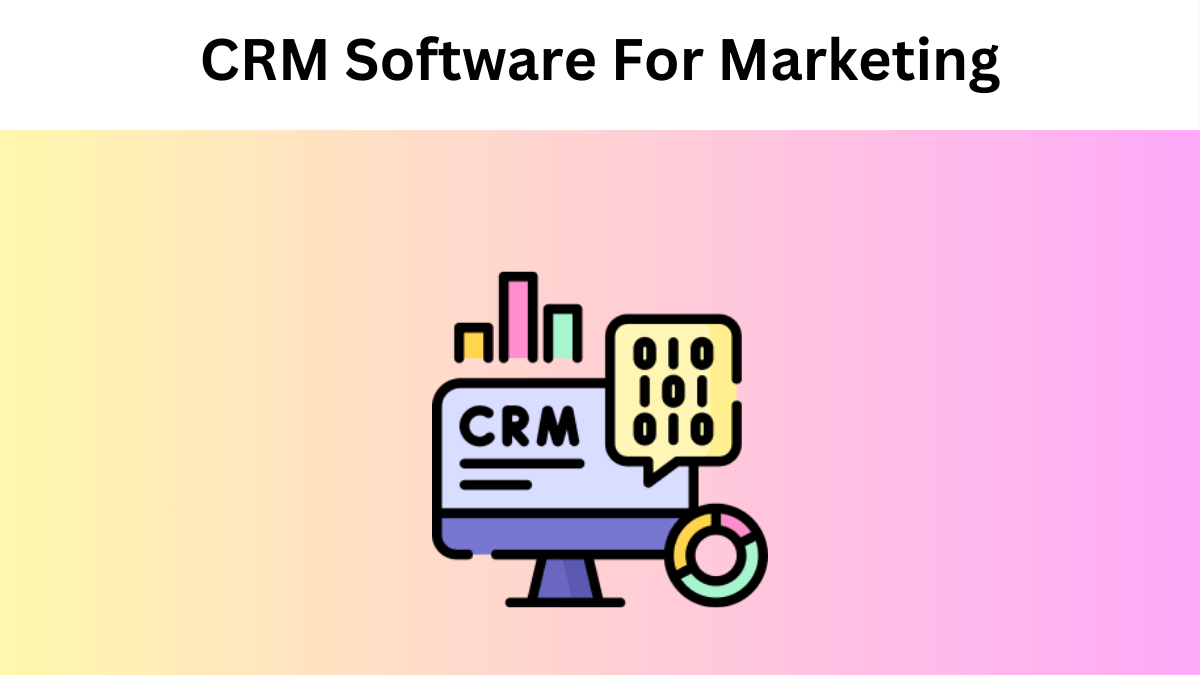CRM Software for Marketing: Features, Benefits, and Market Insights
The contemporary business competition demands companies to master both customer relationship comprehension and relationship management.
The development of Customer Relationship Management (CRM) software has become essential for businesses who want to develop better marketing plans and operating procedures while building strong and lasting customer connections.
A CRM system operates as a unified platform for gathering and unifying customer details with all their encounters and data analytics. Companies which use CRM systems obtain a complete customer understanding that lets them develop personalized marketing initiatives along with enhanced customer support capabilities while making data-driven choices.
Contents
The inclusion of CRM tools in marketing approaches maximizes spending efficiency while improving total customer satisfaction.
CRM Software For Marketing: Global Market Statistics
The global Customer Relationship Management (CRM) software market was valued at approximately $82.7 billion in 2023 and is expected to surge to $181.9 billion by 2030, expanding at a compound annual growth rate (CAGR) of 10.4% over the forecast period.
This growth is driven by the increasing adoption of digital technologies, the need for businesses to manage customer interactions efficiently, and the rising importance of personalized customer experiences.
The integration of artificial intelligence (AI) and machine learning into CRM systems is also expected to play a pivotal role in transforming the market landscape.
Key Features of CRM Software in Marketing
1) Customer Data Management
The database of CRM systems contains total customer information that includes details about personal contacts along with what customers have bought and their documented communications. The centralized database provides marketers with the ability to properly divide audiences and deliver personalized marketing strategies based on customer-specific requirements.
2) Automation of Marketing Tasks
Marketers can program automated executions of their marketing initiatives which spread across email messaging and social media networks and SMS platforms. Consistent messaging becomes possible through this system which enables marketers to spend their time developing strategies.
3) Analytics and Reporting
The analytics components built into CRM software reveal performance metrics of marketing campaigns together with behavioral patterns of customers and details about sales patterns. The analytical data helps organizations make evidence-based marketing decisions while optimizing their strategies permanently.
4) Lead Management
A CRM system follows the sales lifecycle through every step until the lead becomes a conversion. The tracking system enables businesses to identify areas of slowdown and discover ways to enhance their lead development process better.
5) Integration Capabilities
Current CRM platforms unify customer engagement by connecting with different application systems including email marketing platforms as well as social media channels and e-commerce systems.
Benefits of Implementing CRM in Marketing
Enhanced Customer Segmentation: Companies use customer data analysis to divide their market audience into specific segments that makes marketing efforts both accurate and productive.
Improved Customer Retention: The ability to interact with customers through CRM platforms while providing quick follow-ups leads to enhanced customer satisfaction along with increased loyalty.
Increased Efficiency: Automating basic marketing duties eliminates manual work while decreasing mistakes at the same time it speeds up promotional campaign delivery.
Better ROI Measurement: Strategic reporting functionalities enable businesses to determine the precise ROI of their promotional strategies for better resource distribution.
The Role of CRM Software Development Companies
To fully leverage the benefits of CRM systems, businesses often collaborate with specialized CRM software development company.
The companies deliver customized business solutions that integrate perfectly with present procedures and IT frameworks. The CRM system receives ongoing maintenance together with current market trend and technological advancement alignment from these companies.
The Importance of Software Consulting Services
Organizations need to plan and execute CRM system implementation strategies as part of a considerable and complex project. Software consulting services play a crucial role in this process by assessing business requirements, recommending suitable CRM solutions, and guiding the implementation process.
The selection of a CRM system must adhere to business objectives to produce desired performance outcomes.
Emerging Trends in CRM for Marketing
Artificial Intelligence and Machine Learning:
When AI and machine learning integrate into CRM systems organizations can access predictive analytics while receiving personalized customer engagements and developing better decisions.
Social CRM:
Businesses that integrate their CRM system with social media functionality can connect directly with customers through their preferred communities thus strengthening customer relationships along with brand loyalty. These integrations often overlap with collaborative CRM models, which emphasize seamless communication across departments and channels to deliver unified customer experiences.
Mobile CRM:
Today’s CRM system development focuses on mobile compatibility which enables sales and marketing staff to reach customer data and perform work operations outside traditional office settings.
Customer Experience Focus:
Modern business customer relationship management software focuses on complete customer experience optimization through standardized positive interactions that span every interaction point.
Challenges in CRM Implementation
While the benefits of CRM systems are substantial, businesses may encounter challenges during implementation, including:
Data Integration: The process of uniting data from multiple sources within one CRM framework demands thorough work during an extended period.
User Adoption: All team members need proper training combined with change management strategies for successful CRM system usage.
Customization Needs: Businesses may require specific customizations to align the CRM system with their unique processes, necessitating additional development efforts.
Conclusion
Modern marketing heavily relies on CRM software because it provides essential capabilities that improve understanding of customers while improving operational efficiency and business expansion.
Businesses should collaborate with CRM software development companies to receive customized CRM solutions by utilizing software consulting services for their specific needs.
Investing in emerging trends and active implementation challenge resolution will help businesses achieve optimal returns from their CRM software investments.
